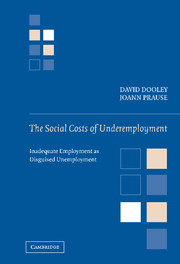Book contents
- Frontmatter
- Contents
- Preface
- 1 Disguised Unemployment and Changing Forms of Work
- 2 The Social Costs of Unemployment
- 3 Data Sources and Methods
- 4 Reverse Causation: Findings on the Selection Hypothesis
- 5 Leaving School: Self-esteem in an Unwelcoming Economy
- 6 Early Adulthood: Alcohol Misuse and Underemployment
- 7 Settling Down: Psychological Depression and Underemployment
- 8 Extending the Employment Continuum: Well-Being in Welfare Transitions
- 9 The Next Generation: Underemployment and Birthweight
- 10 Conclusions
- 11 New Directions
- Appendix A
- Appendix B
- References
- Name Index
- Subject Index
5 - Leaving School: Self-esteem in an Unwelcoming Economy
Published online by Cambridge University Press: 27 July 2009
- Frontmatter
- Contents
- Preface
- 1 Disguised Unemployment and Changing Forms of Work
- 2 The Social Costs of Unemployment
- 3 Data Sources and Methods
- 4 Reverse Causation: Findings on the Selection Hypothesis
- 5 Leaving School: Self-esteem in an Unwelcoming Economy
- 6 Early Adulthood: Alcohol Misuse and Underemployment
- 7 Settling Down: Psychological Depression and Underemployment
- 8 Extending the Employment Continuum: Well-Being in Welfare Transitions
- 9 The Next Generation: Underemployment and Birthweight
- 10 Conclusions
- 11 New Directions
- Appendix A
- Appendix B
- References
- Name Index
- Subject Index
Summary
A man's work is the primary base for his life in society. Through it he is ‘plugged into’ an occupational structure and a cultural, class and social matrix. Work is also of great psychological importance; it is a vehicle for the fulfillment or negation of central aspects of self.
Levinson, 1978, p. 9.In general, we obtain the same effects upon the personality of unemployed youth as upon that of unemployed adults, but because of the greater susceptibility of youth and because they are going through a transition period between childhood and maturity these effects are probably more lasting.
Eisenberg & Lazarsfeld, 1938, p. 383.INTRODUCTION
This chapter explores the relationship between employment status and self-esteem in young people. Controlling for their self-esteem when the NLSY respondents were still in secondary school, does later self-esteem vary depending on whether the school-leaver is unemployed, inadequately employed, adequately employed, or out of the labor force?
Employment and development
Work and Childhood. Child labor laws now encode the consensus that young children risk serious harm from most kinds of labor. This harm may be either physical (e.g., risk of injury) or psychological (e.g., denial of appropriate education). These laws do not allow young children to work except under unusual circumstances (e.g., child actors) and then only with careful monitoring to protect against exploitation and mitigate the risks (e.g., providing tutors on the movie set). Nevertheless, reports still surface from time to time of child labor being practiced under horrific circumstances.
- Type
- Chapter
- Information
- The Social Costs of UnderemploymentInadequate Employment as Disguised Unemployment, pp. 88 - 110Publisher: Cambridge University PressPrint publication year: 2003



